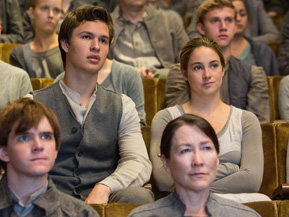Movie Review: Divergent
By Matthew Huntley
March 31, 2014
BoxOfficeProphets.com

Stories like this have become exceedingly commonplace - so much, in fact, they practically make up a subgenre all their own, across both the literary and cinematic landscapes. Unfortunately for Divergent, as a film at least (I haven’t read Veronica Roth’s novel), its narrative treads overly familiar territory and we feel like we’ve “been there, done that.” As a result, it’s not able to stand out among its brethren and serves as little more than a slight diversion (no pun intended) for the Saturday matinee crowd, who likely won’t remember it for very long afterward.
The movie takes place in a futuristic Chicago, some years after a devastating war left the city dilapidated and in near ruin. A large, protective fence surrounds the urban area, supposedly in an effort to protect it from outside forces, though little is told to us about the actual war or what lies beyond the fence, which I’ve no doubt we’ll find out in the sequels (Divergent was Roth’s first installment in a trilogy, though if the movie series follows the same trend as Harry Potter, Twilight and The Hunger Games, the last chapter will be broken up into two parts). In the metropolis, skyscrapers stand half erect; former places of attraction are weed-invested and abandoned; and the general atmosphere is quiet and dreary.
That isn’t to say people still don’t live here. Society has been split up into five different factions: Dauntless (the brave and physically adroit police force); Amity (the happy and peaceful farmhands); Erudite (the fact-seeking intellectuals); Candor (the direct and brutally truthful); and Abnegation (the selfless, whose job is to help others in need).
Upon turning 16, men and women are injected with a serum and issued an aptitude test that determines which faction best suits them. Ultimately, it’s their choice, but the safest bet is to join the faction that corresponds to one’s test results, because in the eyes of the government, that’s what you’re “supposed to do,” even if it means joining a faction different from the one you born into and leaving your family behind for good.
Not everybody knows their place, however, and some people are relegated as “factionless,” making them homeless outcasts. This ostracism becomes people’s greatest fear, and it’s no different for Beatrice Prior (Shailene Woodley), who, along with her brother Caleb (Ansel Elgort), was born into Abnegation under her parents (Ashley Judd and Tony Goldwyn). Rumors begin to circulate that Abnegation, which runs the government, is planning an attack on the people, and it’s obvious Jeanine Matthews (Kate Winslet) from Erudite is behind them, all in an effort to assume power. Deep down, she believes it’s human nature to lie, cheat and steal and it’s the government’s duty to control people through any means necessary.
Not if Beatrice has anything to say about it, even if she doesn’t know it yet. Her test results turn out to be inconclusive and her proctor (Maggie Q) informs her she doesn’t belong to just one faction, but three. This makes her a “divergent,” a group the government views as a threat because divergents are incapable of being brainwashed. Beatrice keeps this a secret and decides to join Dauntless, although she’s not exactly sure why, other than she knows she’s not completely selfless like her parents.
Thus begins the movie’s long, drawn-out second act, in which Beatrice, who shortens her name to just Tris, goes through a rigorous two-stage training process, with stage one focusing on physicality and combat, and stage two evaluating mental competence. Those initiates who don’t make the top ten will be dismissed and become factionless. Of course, Tris starts out in last place, but pretty soon her inherent skills and determination begin to reveal themselves and she quickly rises through the ranks. It helps that her hunky instructor, who goes by the name Four (Theo James), takes a liking to her. To no surprise, a romance blossoms between the two as they console each other and disclose their innermost secrets, fears, etc.
With its foregone climax in place, complete with shootouts, chase sequences and a culmination of all the knowledge the characters’ obtained in the first two acts, Divergent adds up to a fairly routine “adolescent dystopian movie” that’s sometimes exciting but mostly perfunctory. By the time the ending arrived, I was reflecting on how rigidly the movie adhered to its traditional structure rather than caring about fate of the characters. It’s just as well, since it’s clear from the beginning who will live, who will die and who will go over to the dark side. This doesn’t make the movie bad, per se, but it does make it a template, and template narratives simply aren’t as interesting as original ones.
This is a shame, too, since the performances are actually quite good, especially Woodley, who creates a likable, empathetic and convincing heroine. We root for her because she seems real, despite the confines of the screenplay.
It’s already been confirmed the last two books in Roth’s trilogy will be made into movies, and hopefully if this first installment is successful enough, it will give the filmmakers the leverage and confidence to be more creative with the sequels, allowing them to stray from the standards that often govern movies like this. Their goal should be to craft and present them in such way that we won’t be able to describe them as movies “like this.”